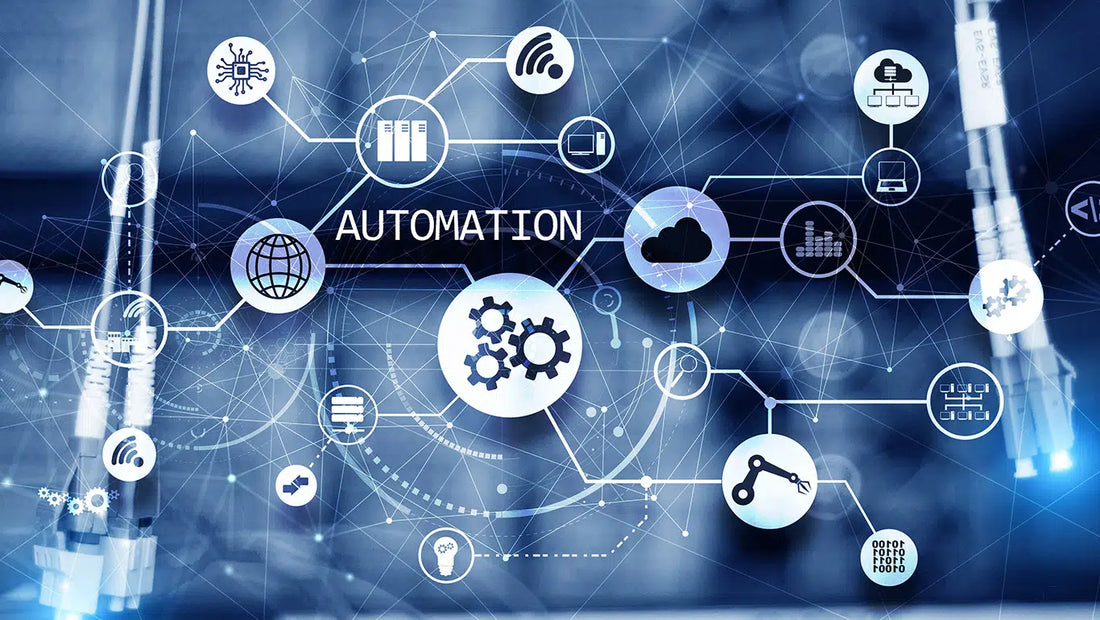
Emerging Technologies and Latest Developments in Industrial Process Automation
Share

Introduction
Industrial process automation is reshaping the way industries operate, making processes smarter, more efficient, and cost-effective. As the world moves into the era of Industry 4.0, automation is becoming an integral part of industrial sectors worldwide. Leveraging technologies such as Artificial Intelligence (AI), the Internet of Things (IoT), cloud computing, and more, industrial automation helps businesses increase productivity, reduce costs, and improve decision-making.
This blog explores the emerging technologies driving the industrial process automation revolution and their potential to transform industries, providing exciting opportunities for investors to capitalize on the growth of this sector.
Advanced Technologies in Industrial Process Automation
1. Artificial Intelligence (AI) and Machine Learning (ML)
AI and ML are revolutionizing industrial process automation by enabling machines to learn, adapt, and make informed decisions. These technologies can analyze vast amounts of real-time data collected from sensors, helping industries optimize processes and make faster, data-driven decisions. AI and ML are essential in predictive maintenance, improving operational efficiency, and reducing downtime.
In 2023, ABB introduced the ABB Ability System 800xA 7.1, a digital platform that incorporates AI and ML to improve process automation. The platform provides advanced analytics, cybersecurity features, and helps industries minimize environmental impact. With AI and ML transforming industries, companies leading in these innovations are poised for rapid growth, creating profitable opportunities for investors.
2. Internet of Things (IoT)
IoT technology connects devices, machines, and systems within industrial environments, enabling real-time monitoring, control, and data sharing. IoT helps enhance efficiency, reduce downtime, and prevent operational disruptions by providing actionable insights. By connecting equipment, IoT allows businesses to track performance and perform predictive maintenance.
Honeywell's launch of Honeywell Forge RealTime in 2022, an IoT platform for industrial data analytics, exemplifies the growing trend of IoT adoption in industrial automation. Additionally, Honeywell’s IoT lab in Romania focuses on research and development to improve industrial efficiency and safety. For investors, the rise of IoT in industrial settings signals a growing market for connected devices and real-time monitoring solutions.
3. Cloud Computing
Cloud computing plays a crucial role in industrial process automation by enabling manufacturers to store, analyze, and access data from anywhere. Cloud-based platforms allow companies to make informed decisions, streamline operations, and enhance collaboration across teams and locations.
Yokogawa's cloud-enabled Collaborative Information Server (CIS), launched in 2022, allows real-time sharing and analysis of plant data. This cloud-based system helps businesses improve operational efficiency and access critical data remotely, supporting flexible and scalable operations. The growth of cloud computing in automation signals increasing opportunities in cloud services and industrial analytics, making this a key area for investors to watch.
4. Collaborative Robots (Cobots)
Cobots are designed to work alongside human workers to improve safety and productivity. Unlike traditional industrial robots, cobots are lightweight and capable of collaborating directly with humans on tasks such as assembly, machine tending, and material handling. By taking on repetitive or dangerous tasks, cobots free up workers to focus on more complex tasks.
In March 2023, Omron launched its TM Series collaborative robots, which are capable of handling heavy payloads and come with built-in safety features. These robots are specifically designed for industries seeking efficient, safe, and scalable automation solutions. The growing demand for cobots presents promising investment opportunities in robotic automation solutions for manufacturing and beyond.
5. Augmented Reality (AR) and Virtual Reality (VR)
AR and VR technologies are revolutionizing industrial automation, especially in training, maintenance, and remote assistance. These technologies allow workers to visualize complex systems, reducing errors and improving the efficiency of industrial processes. Additionally, AR and VR enhance remote monitoring, allowing experts to provide guidance and support to on-site workers.
In 2023, Schneider Electric partnered with Capgemini and Qualcomm Technologies to accelerate the adoption of 5G technology in industrial automation, using AR and VR to optimize manufacturing operations. This strategic collaboration offers investors an opportunity to tap into the expanding market of virtual connectivity, predictive maintenance, and remote operational control.
6. Cybersecurity
As industrial automation systems become more connected, cybersecurity has become a crucial concern. Industrial facilities are increasingly vulnerable to cyberattacks, making it essential to develop secure communication protocols and advanced threat detection solutions to protect sensitive data and operations.
Rockwell Automation launched new managed services in 2022 for threat detection and motion control analysis, helping manufacturers improve cybersecurity and optimize production. The increasing need for secure automation systems presents a valuable opportunity for investment in cybersecurity solutions within the industrial sector.
Conclusion
The industrial process automation sector is undergoing a massive transformation, with emerging technologies like AI, IoT, cloud computing, cobots, AR/VR, and enhanced cybersecurity reshaping industries worldwide. These advancements are helping industries achieve greater efficiency, reduce operational costs, and enhance productivity, driving the growing adoption of automation technologies.
For investors, the industrial automation sector presents immense growth potential. As businesses continue to invest in intelligent, connected, and efficient solutions, the demand for automation technologies will rise, creating lucrative opportunities for those involved in this transformative space.
By staying ahead of these technological trends and understanding their long-term impact, investors can position themselves for success in the rapidly evolving industrial automation market. With these innovations paving the way for smarter, safer, and more efficient industries, the future of industrial process automation looks promising—and so does the potential for profitable investments.